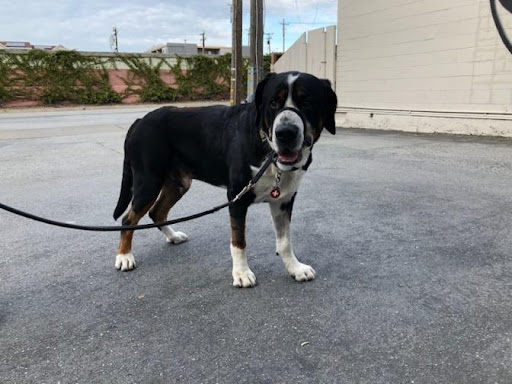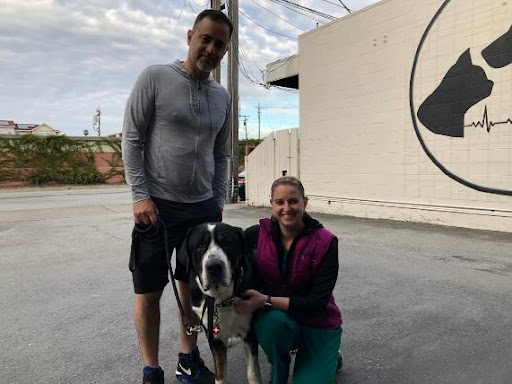Obi Bourdan is a five-year-old Swiss mountain dog who usually comes bounding to greet his owners at the door when they return from work every afternoon, perhaps with a leash in his mouth, signaling that it’s time for a walk! But one February day in 2023, Obi didn’t come bounding to the door as usual. His owners found him lying down in the kitchen, uninterested in a walk or even in his favorite treat. They were immediately concerned and knew something was not right.
Obi’s family recalled hearing about a problem that large and giant breeds can have with their stomach and that it could be something very serious. It was after hours and their family veterinarian was closed, so they called North Peninsula Veterinary Emergency Clinic. The staff here were concerned about Obi’s symptoms, too, and we encouraged the Bourdans to bring him in as soon as possible.
Upon arrival, Obi presented in shock, lethargic, and recumbent (lying down). These are all possible signs of gastric dilation and volvulus (GDV) and bloat, which are very serious gastrointestinal emergencies for which large and giant breed dogs are at risk. These signs, along with Obi’s breed, made the team highly suspicious of GDV. They immediately sprung into action, dividing responsibilities to treat Obi’s shock with intravenous fluids and drugs, obtain an accurate history from Obi’s family, run a full blood panel, and obtain radiographs (x-rays) to differentiate which of these gastrointestinal problems was the most likely.
 In addition to bloat and GDV, signs like Obi’s can occasionally be caused a mesenteric torsion, a far more serious condition where the intestines twist on the mesenteric axis. The mesentery consists of the blood vessels, nerves, and lymphatic supply for the intestines. This twisting constricts the intestines, creating a life-threatening problem where the intestinal blood supply is compromised and causes rapid death of the intestines. Other signs of mesenteric torsion may include vomiting and diarrhea, possibly with blood. Occasionally abdominal distension (visible expansion with a firm belly) may occur.
In addition to bloat and GDV, signs like Obi’s can occasionally be caused a mesenteric torsion, a far more serious condition where the intestines twist on the mesenteric axis. The mesentery consists of the blood vessels, nerves, and lymphatic supply for the intestines. This twisting constricts the intestines, creating a life-threatening problem where the intestinal blood supply is compromised and causes rapid death of the intestines. Other signs of mesenteric torsion may include vomiting and diarrhea, possibly with blood. Occasionally abdominal distension (visible expansion with a firm belly) may occur.
Our team of veterinarians identified Obi’s problem as a mesenteric torsion and immediately let the owner know Obi would need emergency surgery to correct this life-threatening gastrointestinal problem. Mr. Bourdan approved the surgery and treatment, and our dynamic surgery team had Obi prepped and ready in no time. One of our trained veterinary surgeons, together with one of our seasoned overnight veterinarians, performed exploratory surgery to locate and correct the twist.
Obi made it through surgery and anesthesia, but he was still not out of the woods that evening. Dogs recovering from gastrointestinal emergencies run the risk of fluid seeping into the abdomen from inflammation of the organs, as well as an additional life-threatening condition called disseminated intravascular coagulation (DIC). He remained hospitalized with continuous monitoring of his blood pressure, heart and respiratory rate, and cardiac rhythm. We held our breath and watched him closely for another 24 hours.
After 48 hours of round-the-clock care at NPVEC, Obi was feeling much more like himself and was ready to be discharged. He was sent home with medications, a special diet, and strict order for generous TLC.
Obi was an extremely lucky dog that night, but not only due to our amazing team of veterinarians, technicians, and CSRs that worked to efficiently and swiftly diagnose and treat him; it was Obi’s very astute owner who recognized the signs of trouble and sought care for him just as swiftly. We are grateful to the Bourdan family for entrusting us to Obi’s care and we could not have been happier to see him return for his recheck appointment looking like his usual happy self!

